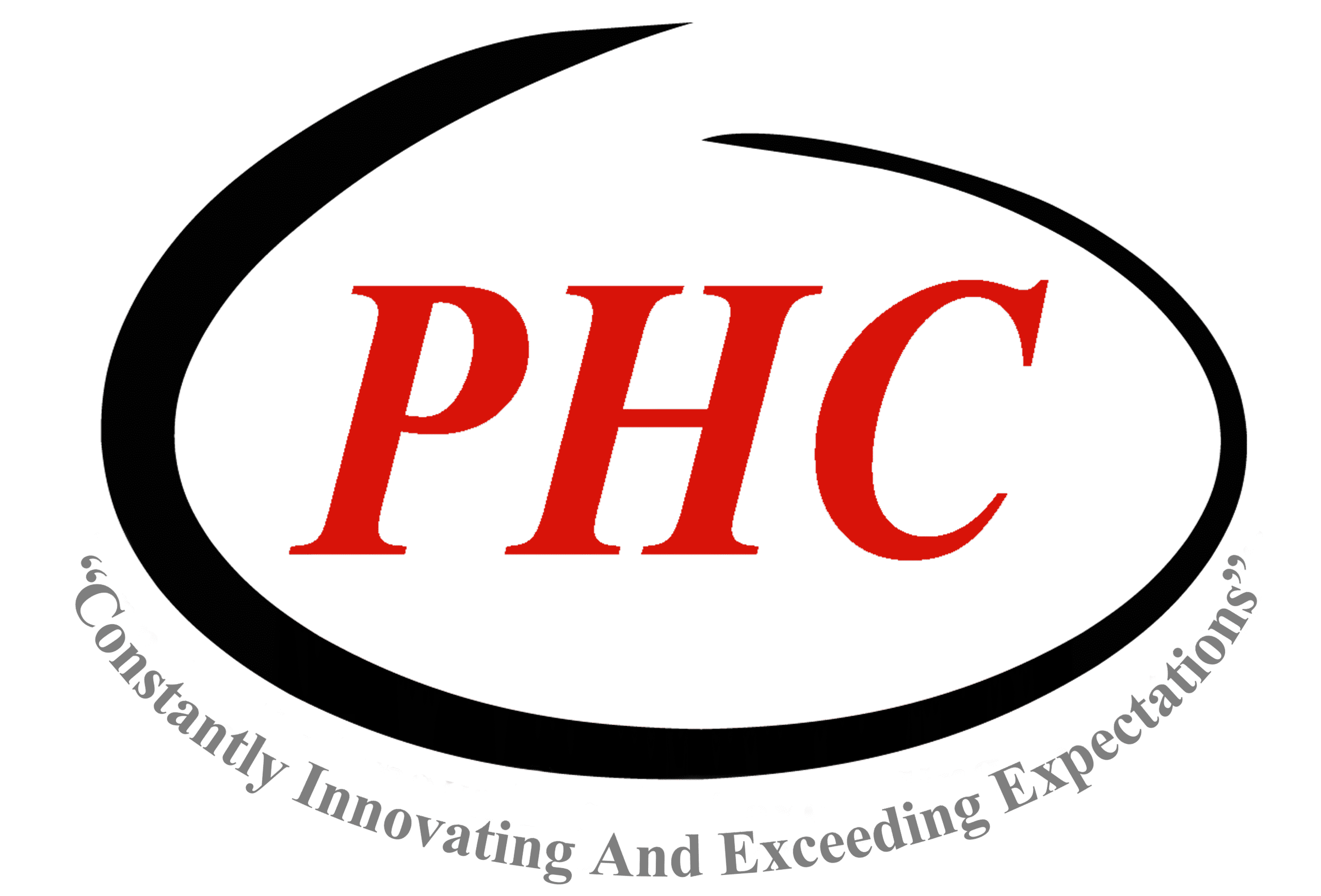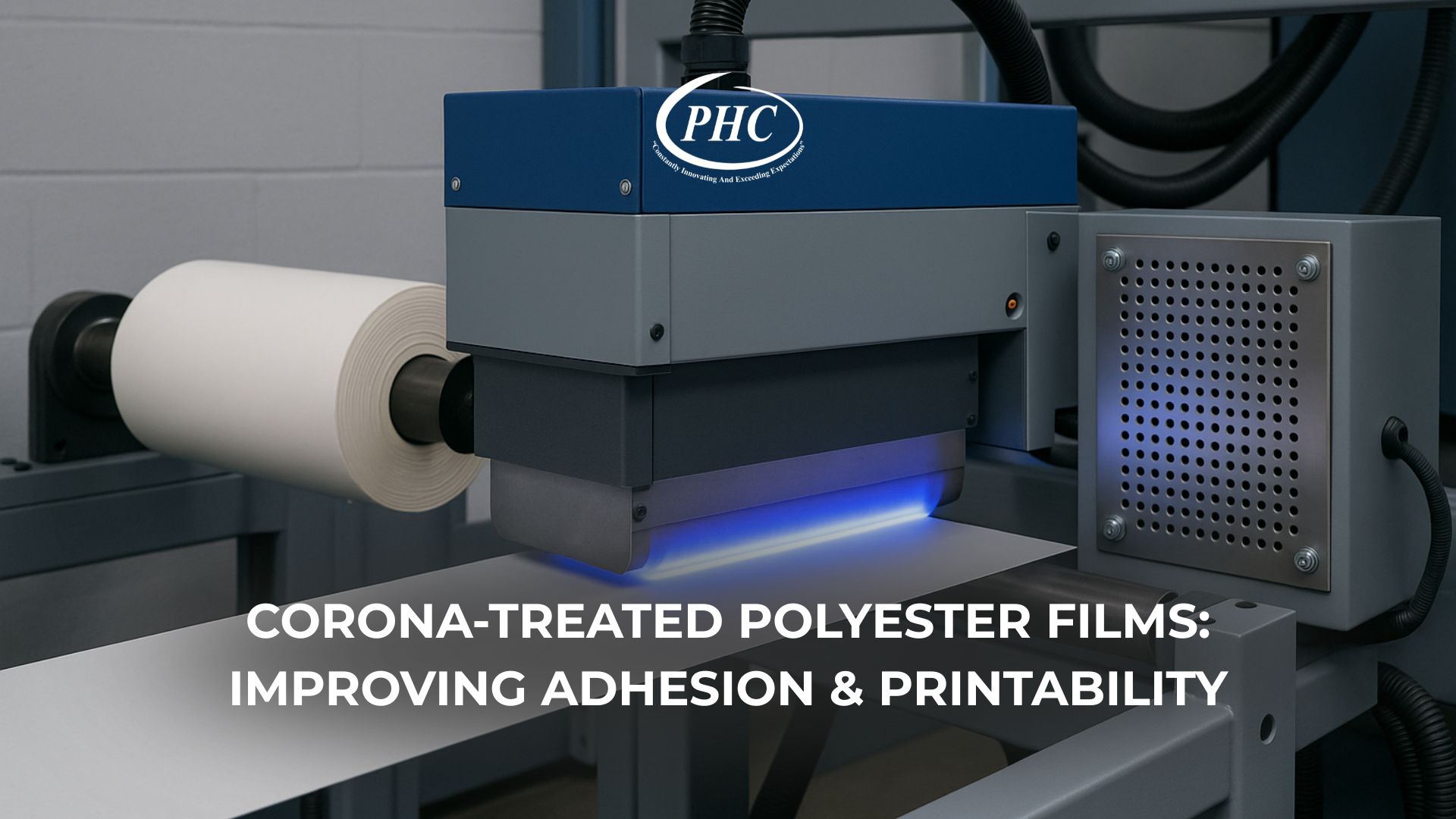In the world of advanced materials, performance often begins at the surface. A film may have the perfect mechanical strength, clarity, and flexibility — but if coatings, inks, or adhesives can’t bond effectively, the entire product fails to perform.
That’s why corona-treated polyester films have become essential in industries where adhesion and print quality matter most. By modifying the very top layer of a PET (polyethylene terephthalate) surface, corona treatment enables exceptional bonding with inks, coatings, and adhesives — turning a naturally inert material into a highly receptive one.
At Pilcher Hamilton Company (PHC), based in Greer, South Carolina, we’ve spent over a century perfecting the craft of polyester film conversion, coating, and surface treatment. Our in-house corona treating service transforms standard PET films into high-performance substrates for packaging, printing, labeling, lamination, and industrial applications.
If you’ve been searching online for “polyester near me”, our facility at 850 South Buncombe Road, Greer SC is your local destination for precision-engineered PET films and professional corona treating services that meet demanding performance standards.
What Is Corona Treatment?
1. The Science of Surface Energy
Polyester film, by nature, has a low surface energy — around 42 dynes/cm. This means that most inks, adhesives, and coatings tend to bead up or fail to spread evenly across its surface. Without surface modification, even the highest-quality film can suffer from:
- Ink smearing or delamination
- Poor coating coverage
- Adhesive lift or failure
- Reduced print clarity and color adhesion
Corona treatment solves these issues by increasing the surface energy of the film through a controlled exposure to an electrical discharge — literally, a “corona” of plasma energy.
2. How the Process Works
During corona treatment, a high-voltage electrical field is generated between an electrode and a grounded roller. The PET film passes between them, exposed briefly to a stream of ionized air.
This exposure:
- Breaks molecular bonds on the film’s surface
- Introduces polar functional groups (like carbonyl or hydroxyl)
- Creates microscopic roughness that improves wetting and mechanical anchoring
The treated surface becomes chemically active, allowing coatings, adhesives, and printing inks to bond firmly.
The effect is permanent enough for typical processing windows (weeks to months), but PHC also provides re-treatment options for films stored long-term to restore optimum dyne levels.
3. Why Polyester Requires Surface Activation
PET’s natural advantages — clarity, toughness, and chemical resistance — also make it inherently non-reactive. Without treatment, coatings or adhesives simply can’t penetrate or adhere to its smooth molecular surface.
Corona treatment, therefore, is the gateway process that allows PET to perform its full range of industrial and aesthetic functions. It’s used universally in flexible packaging, label stock, lamination films, and specialty coatings.
To learn more about PHC’s standard and custom-treated PET films, visit the Corona-Treated Product Page.
Benefits: Enhanced Adhesion, Printability & Coating Uniformity
The impact of corona treatment extends far beyond adhesion. It enhances every downstream process that depends on consistent, predictable surface behavior.
1. Improved Adhesion to Inks, Coatings & Adhesives
Corona-treated polyester films bond exceptionally well with:
- Solvent-based and water-based inks
- Acrylic and polyurethane coatings
- Pressure-sensitive adhesives (PSA)
- Metallized or laminated layers
This improved adhesion ensures:
- Strong, permanent bonds in laminations
- Crisp, high-resolution print quality
- No delamination or edge curling during die-cutting
- Reliable performance through heat sealing or forming
Converters using PHC’s corona-treated films report lower rejection rates, fewer adhesion failures, and smoother converting lines.
2. Enhanced Printability
In printing applications — from labels and decals to graphic overlays — corona treatment allows inks to anchor uniformly.
Benefits include:
- Brighter colors and sharper images
- Reduced ink usage due to better wetting
- Consistent adhesion even in high-speed printing lines
- Compatibility with flexographic, gravure, offset, and digital systems
Corona-treated PET also holds up under UV curing and thermal drying, making it ideal for both decorative and functional printing.
3. Coating Uniformity and Barrier Performance
For laminating, adhesive coating, or barrier film construction, uniform coating coverage is crucial. Untreated PET can cause pinholes, streaks, or fish-eyes — small imperfections that compromise barrier protection and optical clarity.
Corona treatment resolves these issues by:
- Providing a homogeneous surface for coating adhesion
- Enabling even wetting across wide web widths
- Reducing surface tension differences that cause coating defects
When combined with additional coatings (such as acrylic, PVDC, or silicone), corona-treated PET forms the foundation of high-barrier packaging films and protective laminates.
4. Reduced Blocking and Improved Handling
Corona treatment also modifies the surface micro-texture, reducing static charge and surface blocking (film layers sticking together during winding). This improves roll handling, slitting, and lamination performance, especially for thin gauges and clear films.
Learn more about PHC’s precision Slitting Services for converting corona-treated PET into custom widths and roll sizes.
5. Compatibility with Other Surface Treatments
Corona-treated PET can be combined with:
- Chemical treatments for long-term dyne stability
- Primer coatings for specific adhesive systems
- Top-coats to enhance gloss, matte finish, or barrier properties
PHC’s Coating Services allow multi-layer surface modifications, transforming standard PET into a tailored substrate for your unique process or application.
Applications in Packaging, Printing & Industrial Films
The versatility of corona-treated polyester films makes them indispensable across countless industries. Below are some of the most common — and innovative — uses.
1. Flexible Packaging Films
In food, beverage, and personal care packaging, corona-treated PET acts as a printable, sealable, and durable layer within multi-film laminations. Typical applications include:
- Pouches and sachets
- Lidding films
- Snack and confectionery wraps
- Frozen food packaging
- Boil-in-bag and retort laminates
Its clarity and strength, combined with improved ink adhesion, ensure eye-catching designs that remain intact during high-speed filling and sealing operations.
2. Labels, Decals & Graphic Overlays
For industrial and consumer labeling, adhesion and print clarity are everything. Corona-treated PET offers:
- Superior adhesion for pressure-sensitive adhesives (PSA)
- Compatibility with UV, solvent, and water-based inks
- Resistance to heat, moisture, and chemicals
- Durability for outdoor and automotive labels
Whether for product identification, safety signage, or brand graphics, PHC’s corona-treated PET ensures lasting performance and crisp, vibrant imagery.
3. Industrial Films & Laminates
In technical applications, corona-treated PET serves as a base film for adhesives, coatings, or metallization. Examples include:
- Release liners and adhesive carriers
- Electrical insulation and dielectric films
- Protective films for displays or glass surfaces
- Decorative laminates for furniture and appliances
The enhanced surface energy allows secondary coatings or functional layers to bond permanently — a must for performance-critical environments like electronics, automotive, or aerospace manufacturing.
4. Specialty Coating & Metallization Base
Corona-treated PET provides the perfect foundation for vacuum metallization (aluminum, silver, or gold coatings), producing reflective films used in:
- High-barrier packaging
- Decorative wraps
- Thermal insulation
- Reflective safety products
Because the metal adheres better to the activated PET surface, the resulting film achieves superior brightness, adhesion, and moisture barrier.
5. Sustainable & Recyclable Film Structures
As sustainability drives packaging design, corona treatment enables recyclable mono-material constructions. For example:
- PET-to-PET laminations using water-based adhesives
- PCR (post-consumer recycled) polyester films with restored adhesion
- Solvent-free coating applications with excellent wet-out
PHC’s sustainable film solutions integrate corona treatment with eco-friendly coatings and lightweight gauges, reducing material use while maintaining performance.
PHC’s Corona Treating Services in Greer SC
While many suppliers offer pre-treated PET rolls, Pilcher Hamilton Company distinguishes itself with custom corona treating services — designed for flexibility, consistency, and local support.
1. Local Expertise, Global Standards
From our facility at 850 South Buncombe Road, Greer, South Carolina, PHC delivers precision corona treating, coating, and converting under one roof.
Our process lines are equipped with advanced plasma generators and web tension control systems to ensure:
- Uniform treatment across the entire film width
- Controlled dyne levels for different applications
- Repeatable results across production batches
This consistency is critical for converters and OEMs that require tight process control and traceable quality assurance.
2. Custom Treatment Options
PHC’s corona treating services are available for:
- PET films (clear, hazy, heat-stabilized, metallized, or coated)
- Thicknesses ranging from 12µm to 250µm
- Single- or double-sided treatment
- Roll widths up to 80 inches
We can tailor treatment intensity to match your coating chemistry, ensuring the perfect balance between adhesion and long-term dyne retention.
3. Integrated Converting & Finishing
In addition to corona treating, PHC provides full downstream converting:
- Slitting and rewinding to exact roll sizes
- Sheeting and die-cutting for ready-to-use formats
- Coating and lamination to create functional composites
By handling every stage in-house, we minimize handling damage and lead time — giving customers a single, trusted source for finished, high-performance films.
4. Local Service & “Polyester Near Me”
Being located in Greer, SC, PHC provides a unique advantage to companies across the Southeast and nationwide:
- Shorter delivery times
- Lower freight costs
- Responsive technical support
- Quick prototyping and sample rolls
If you’re searching for “polyester near me”, look no further than PHC — your local partner for world-class corona treating and PET converting solutions.
5. Sustainability and Quality Commitment
PHC operates with a strong focus on energy efficiency and environmental responsibility. Our corona lines are engineered for low-emission operation and use recyclable air filtration systems.
We maintain strict quality checks, including:
- Dyne testing for surface energy verification
- Contact angle measurement
- Adhesion and coating adhesion tests
These quality protocols ensure that every treated roll leaving our facility meets — and exceeds — customer specifications.
When Performance Starts at the Surface
In an era where every micron counts, corona-treated polyester films are proving that small changes at the surface can make a big difference in performance. By improving adhesion, printability, and coating uniformity, corona treatment unlocks the full potential of PET across packaging, labeling, printing, and industrial applications.
At Pilcher Hamilton Company, we combine advanced corona treating technology with more than a century of expertise in film converting and coating services. Whether you need pre-treated PET rolls or custom surface treatment for your unique process, our team in Greer, South Carolina delivers precision, reliability, and local support you can count on.
Because at PHC, performance doesn’t just happen — it’s engineered.
📍 Visit Us:
Pilcher Hamilton Company
850 South Buncombe Road
Greer, SC 29650
Contact Us

